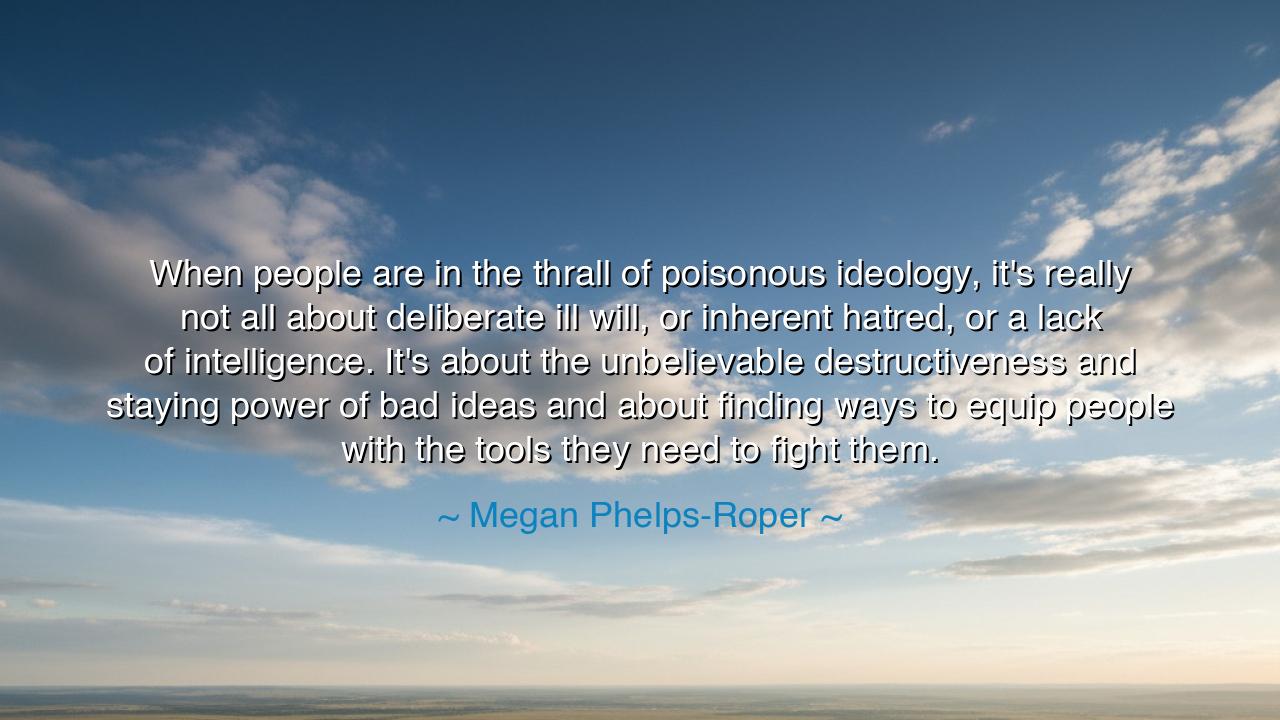
When people are in the thrall of poisonous ideology, it's really
When people are in the thrall of poisonous ideology, it's really not all about deliberate ill will, or inherent hatred, or a lack of intelligence. It's about the unbelievable destructiveness and staying power of bad ideas and about finding ways to equip people with the tools they need to fight them.






In the wise and reflective words of Megan Phelps-Roper, "When people are in the thrall of poisonous ideology, it's really not all about deliberate ill will, or inherent hatred, or a lack of intelligence. It's about the unbelievable destructiveness and staying power of bad ideas and about finding ways to equip people with the tools they need to fight them," we are invited to confront the profound and sometimes terrifying influence that ideology can have over individuals and entire societies. Phelps-Roper speaks to a truth that transcends time: the power of ideas—whether good or bad—shapes the course of human history. Poisonous ideologies, though often rooted in fear, ignorance, or false belief, do not arise solely from malice or evil intent; they persist because of their destructiveness and the resilience of the falsehoods they propagate. This is a reminder that, in combating harmful beliefs, it is not enough to simply fight hatred or ignorance—we must arm ourselves with understanding, reason, and the means to deconstruct the ideas that poison the mind.
This wisdom finds resonance in the teachings of the ancients, who often warned of the power of false beliefs and the dangers of unchecked ideas. Socrates, in his dialogues, sought to question the established ideologies of his time, encouraging his fellow Athenians to think critically about the beliefs that governed their lives. He understood that the most dangerous beliefs were those that were accepted without question, and that the true pursuit of wisdom lay in the willingness to challenge even the most entrenched ideas. In the same way, Phelps-Roper’s words remind us that poisonous ideologies are not merely the result of bad intentions, but of deeply ingrained falsehoods that are passed down and sustained through generations, often without any true understanding of their harm.
The ancient Romans also grappled with the dangers of ideology. The Seneca writings, steeped in stoic philosophy, caution against being enslaved by false ideas and emotional reactions. Seneca taught that humans must strive for reason and clarity in all things, resisting the impulse to fall under the sway of emotion or irrationality. In this light, Phelps-Roper's insight suggests that bad ideas are not inherently evil—they are simply ideas that lack the foundation of truth and rationality. Over time, these ideas can become deeply rooted in individuals and groups, and it becomes a matter of great moral importance to equip people with the tools to break free from the hold of such ideologies, just as the Stoics taught their followers to overcome passions that lead to harm.
Consider the historical example of Martin Luther King Jr., who fought against the poisonous ideologies of racism and segregation that plagued his society. King recognized that the root of these ideologies was not merely hatred, but a deep-seated belief in the superiority of one race over another—an idea that had been perpetuated for centuries. In his quest for justice, King did not just condemn the actions of individuals, but also sought to dismantle the ideology that supported these actions. His commitment to non-violence and peaceful resistance was grounded in the belief that the tools of understanding, love, and reasoning were the antidotes to the destructive falsehoods of racial superiority. In the face of tremendous resistance, King’s wisdom and reason allowed him to confront and eventually begin to dismantle a deeply rooted ideology of hate.
Phelps-Roper’s own story—having been raised within the confines of the Westboro Baptist Church—offers a personal example of the staying power of bad ideas. She spent years immersed in an ideology that preached hatred toward certain groups, believing it to be righteous and true. Yet, through introspection and exposure to differing viewpoints, she was able to escape the grip of that ideology. Phelps-Roper’s transformation underscores a key point: it is not enough to condemn the ideology itself. One must provide people with the tools to understand and question it. The process of challenging a deeply held belief requires not just a rejection of hate, but the cultivation of critical thinking and empathy.
The lesson embedded in Phelps-Roper’s words is one of empowerment and hope. While bad ideas may persist for a time, they are not insurmountable. The antidote to the poison of harmful ideologies lies in providing individuals with the tools to think critically, to question deeply, and to embrace understanding. The ancients spoke of wisdom as the key to overcoming the darker forces of ignorance and tyranny. As we move forward in our own lives, we must remember that the fight against poisonous ideologies is not just about condemnation but about equipping ourselves and others with the ability to reason, to debunk, and to transform the ideas that divide us.
In practical terms, we must cultivate the habit of questioning the ideas we encounter, whether in our families, our communities, or our societies. We must learn to approach each idea with critical thinking, recognizing the potential harm of beliefs that are unchecked and unexamined. By engaging in open dialogue, learning from others, and exposing ourselves to a diversity of perspectives, we arm ourselves with the tools to confront and challenge false ideologies. Just as Socrates did in his time, and as Martin Luther King Jr. did in his, we must stand firm in our pursuit of truth, using reason and compassion to build a more just and understanding world.






AAdministratorAdministrator
Welcome, honored guests. Please leave a comment, we will respond soon